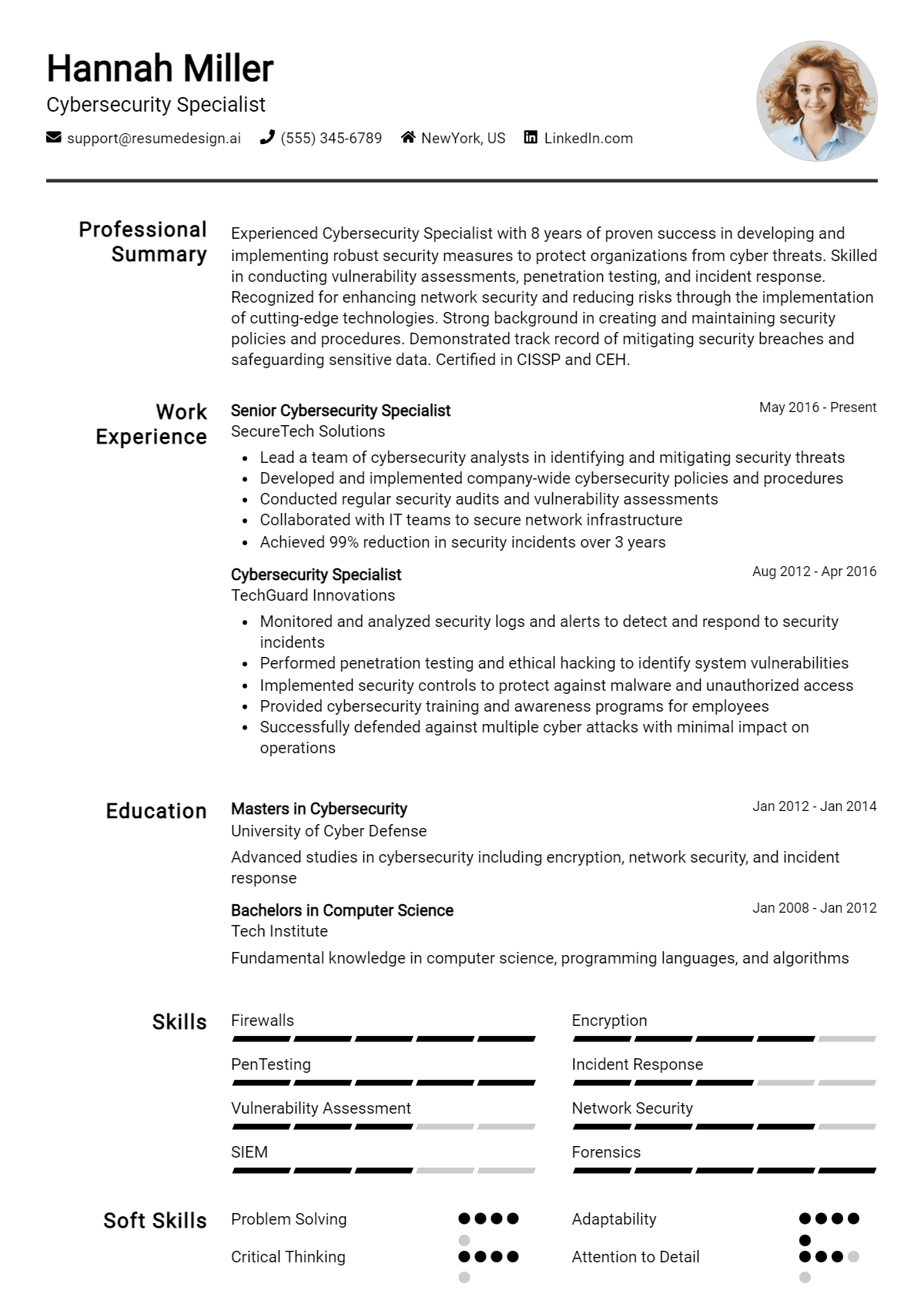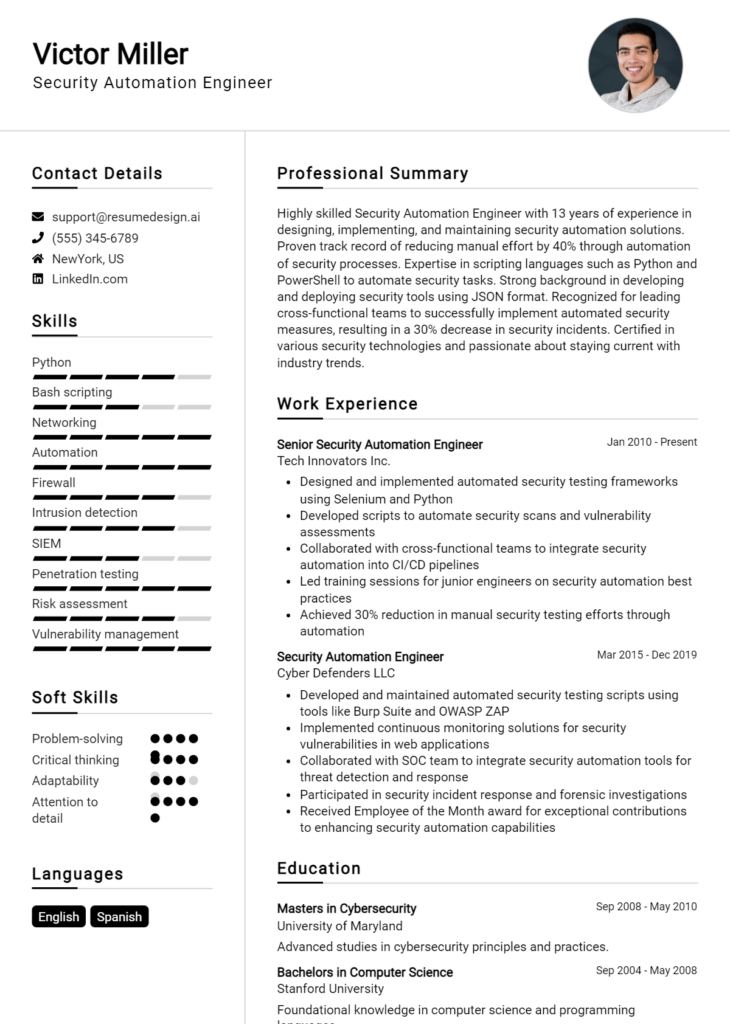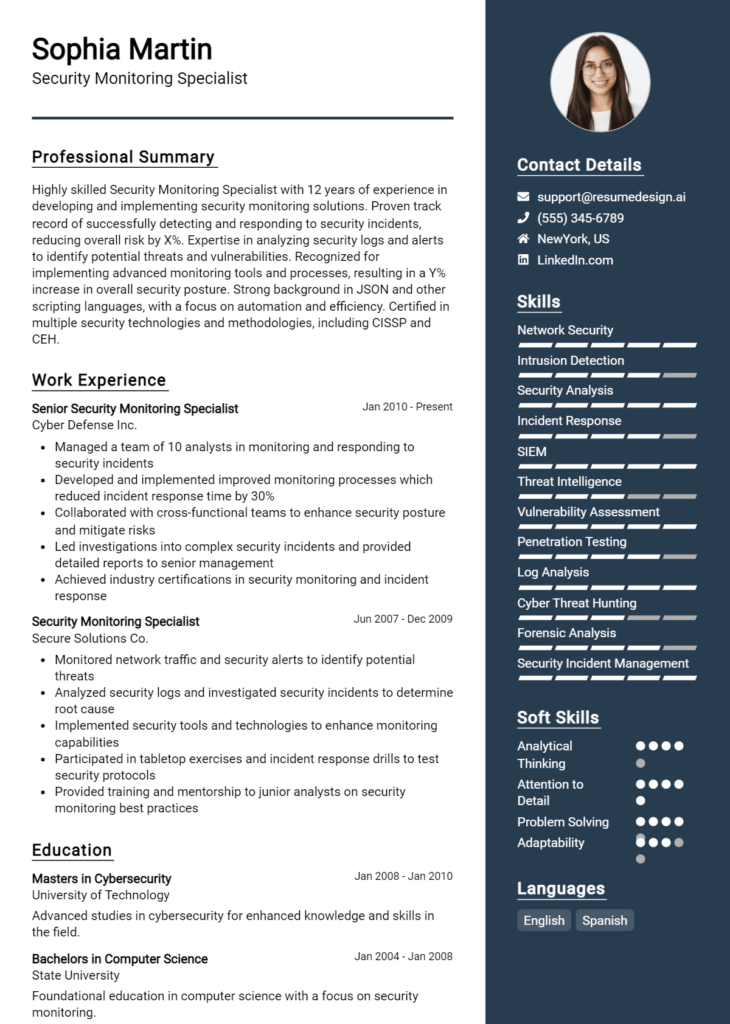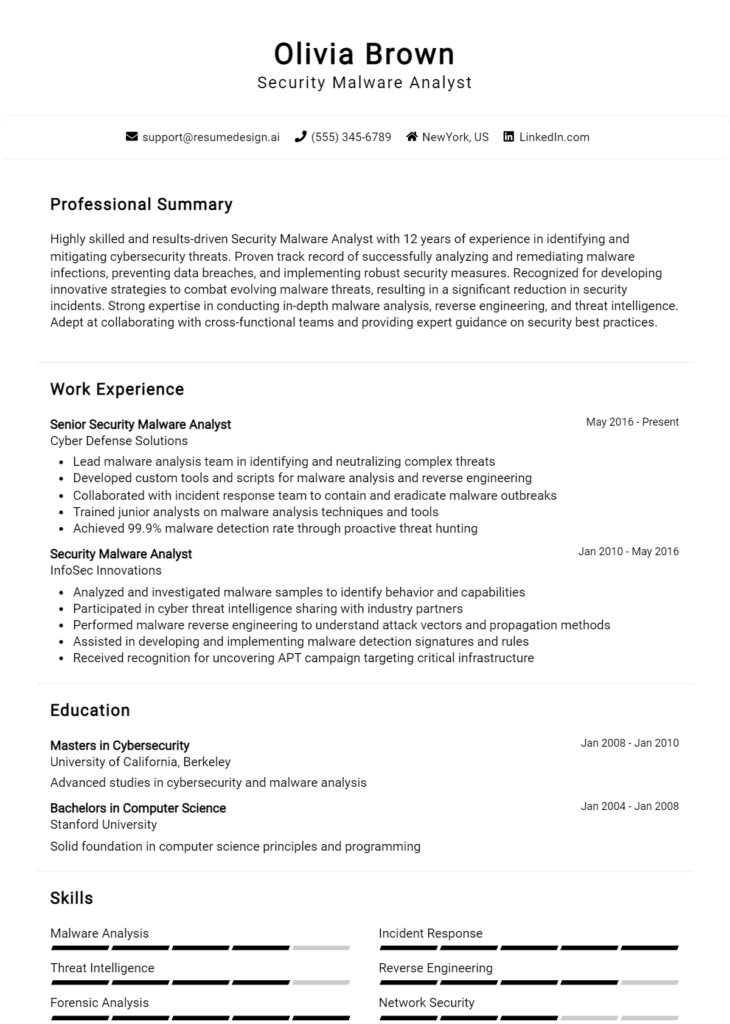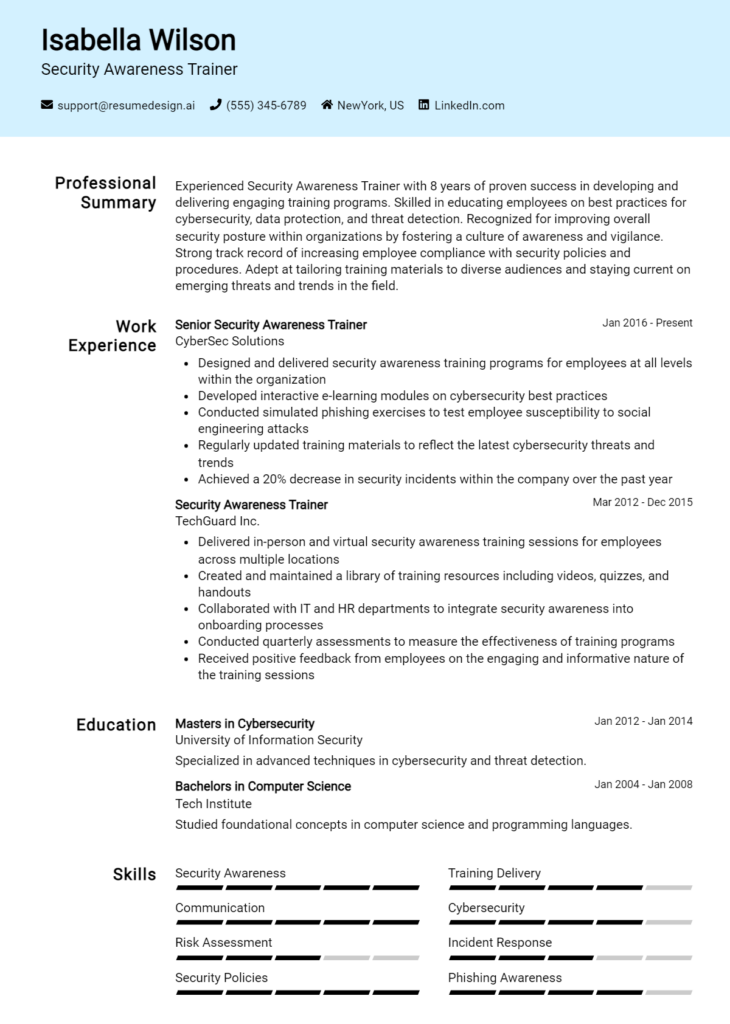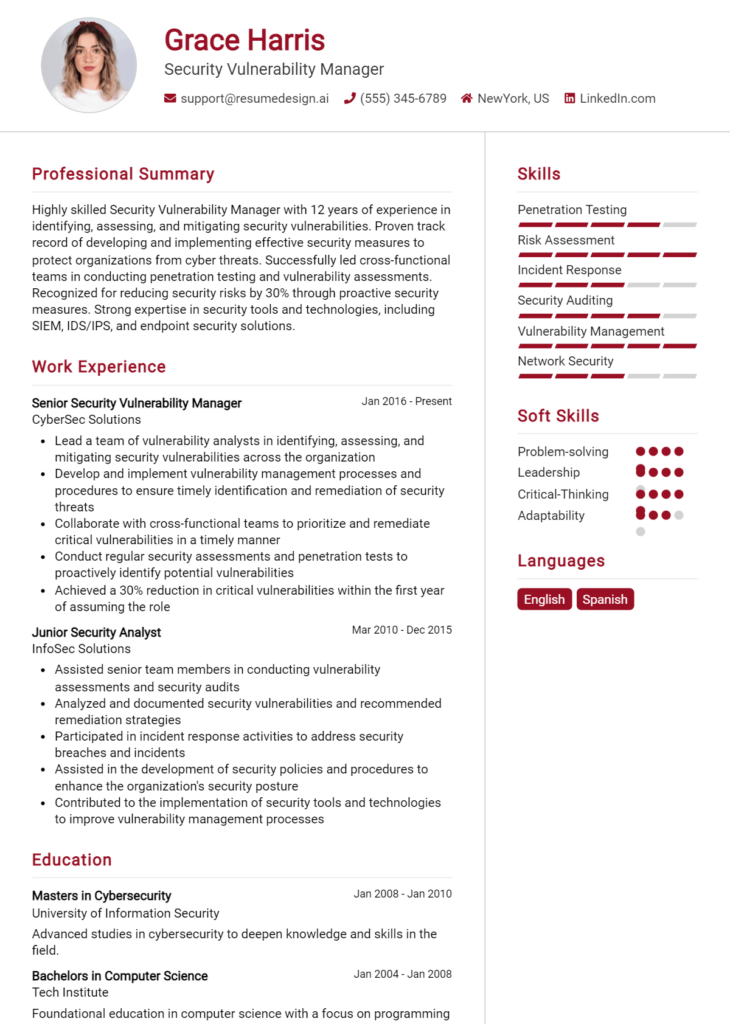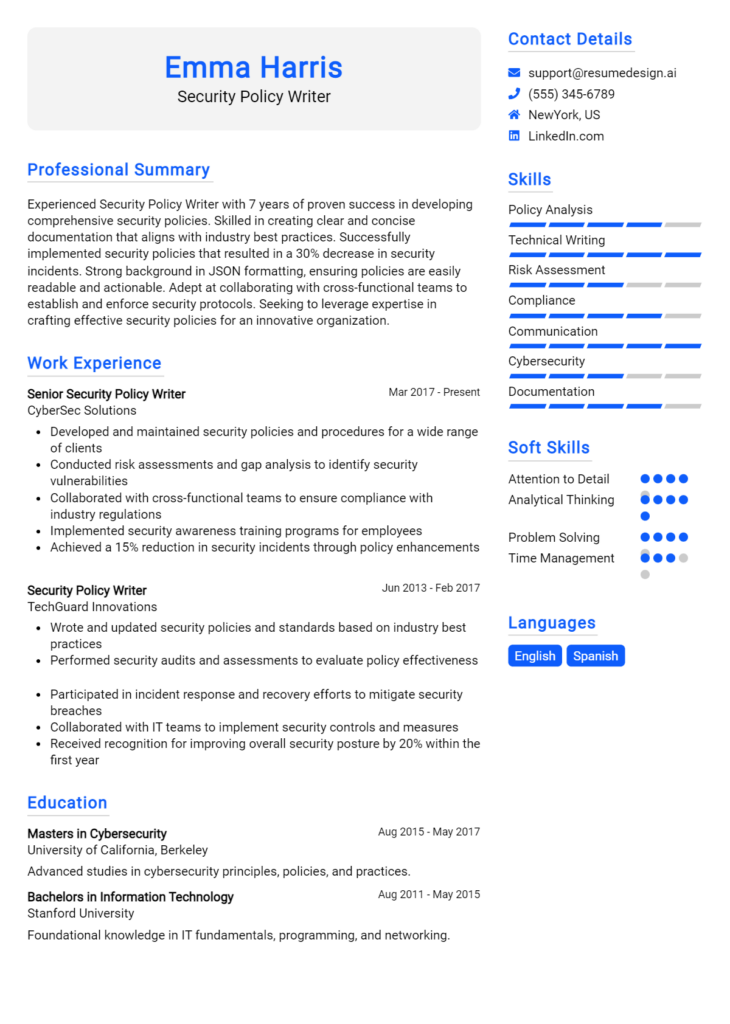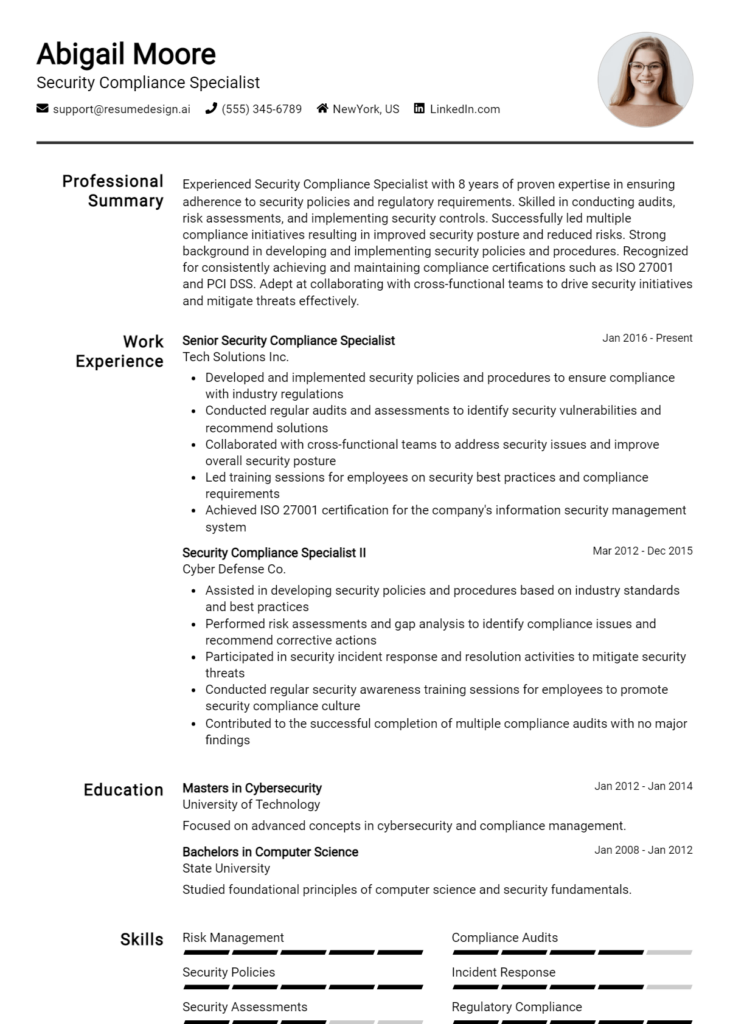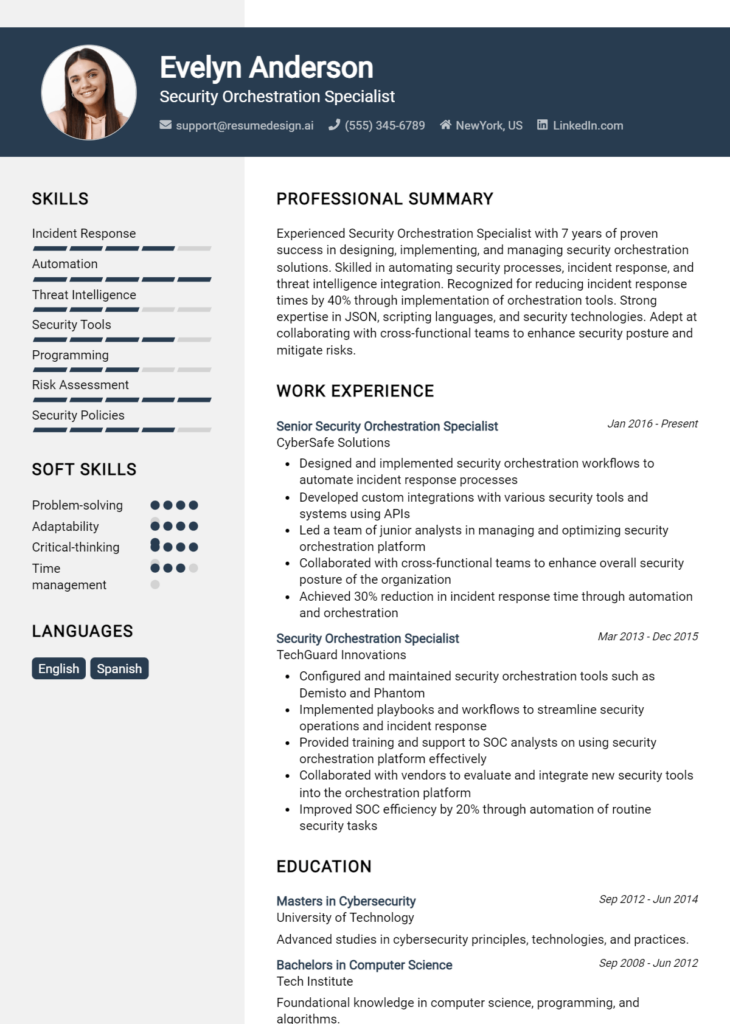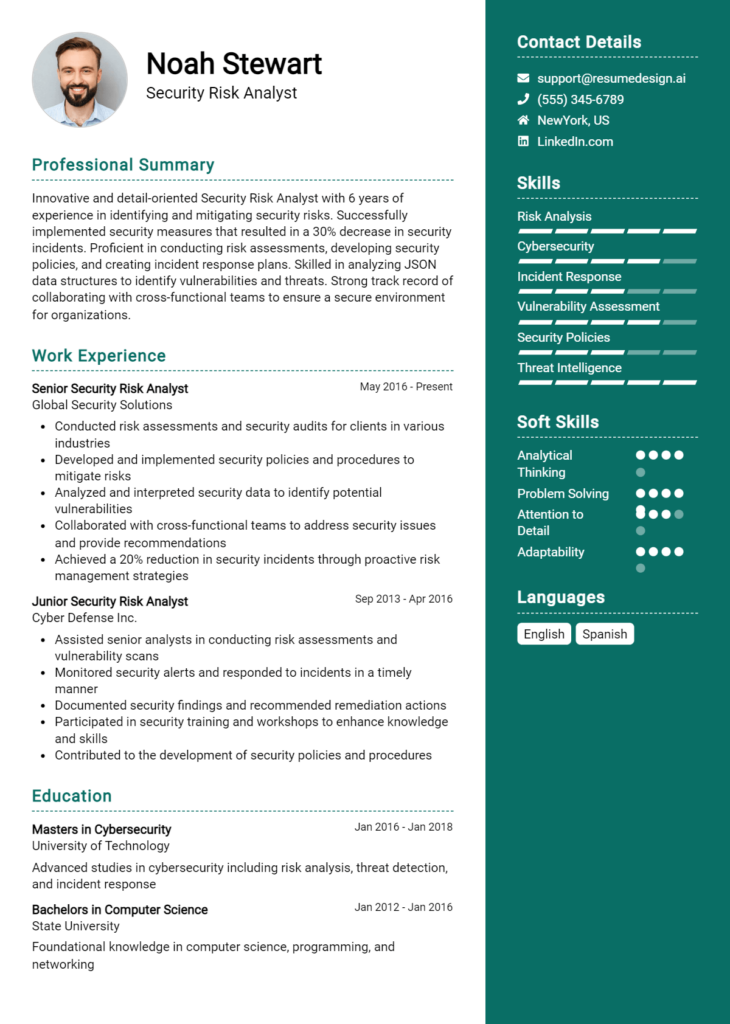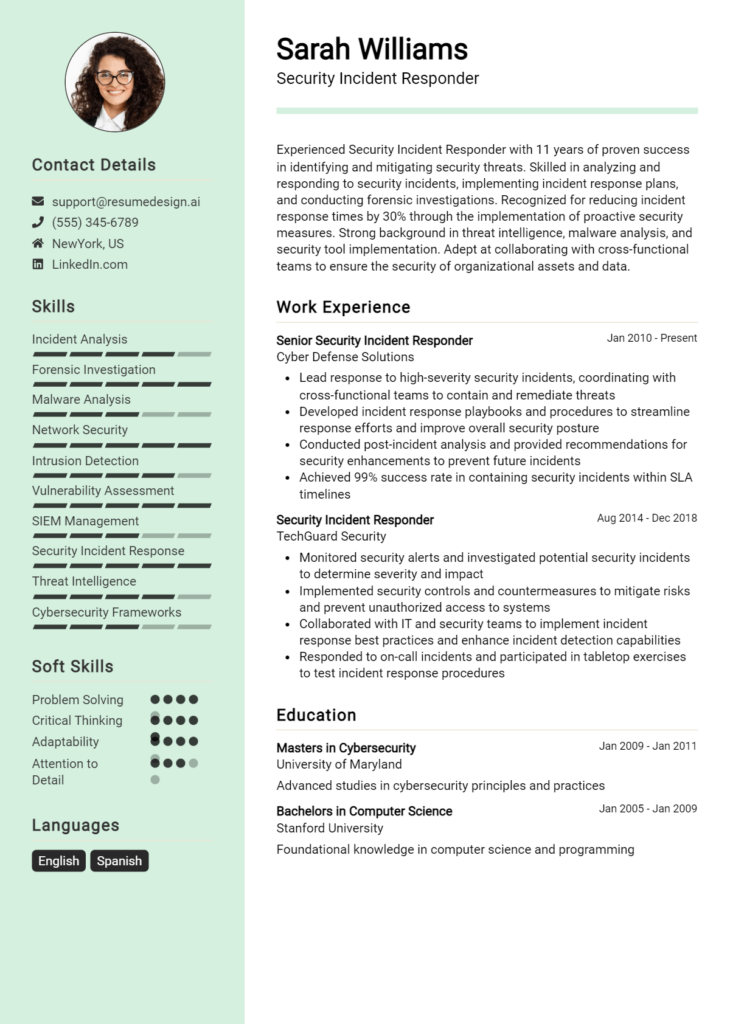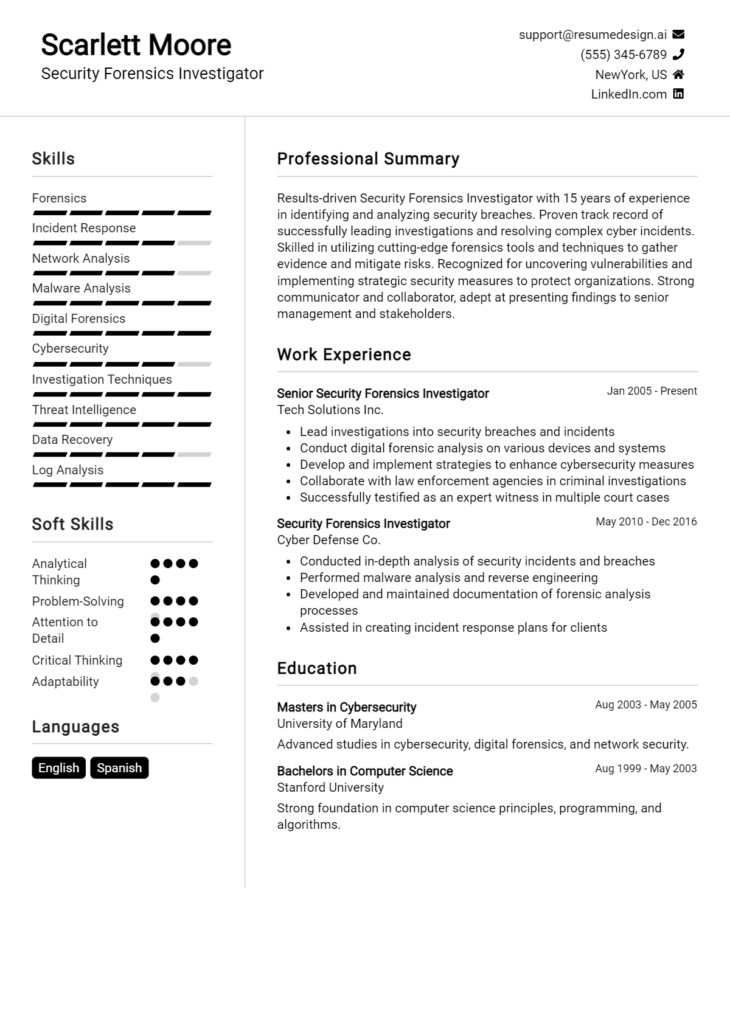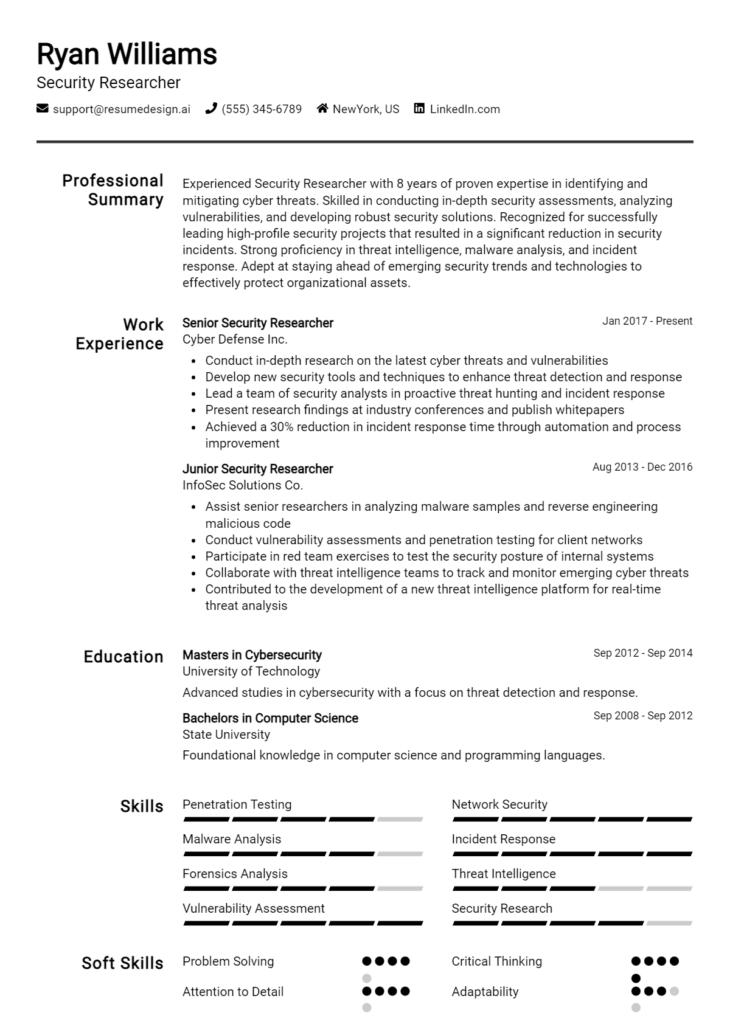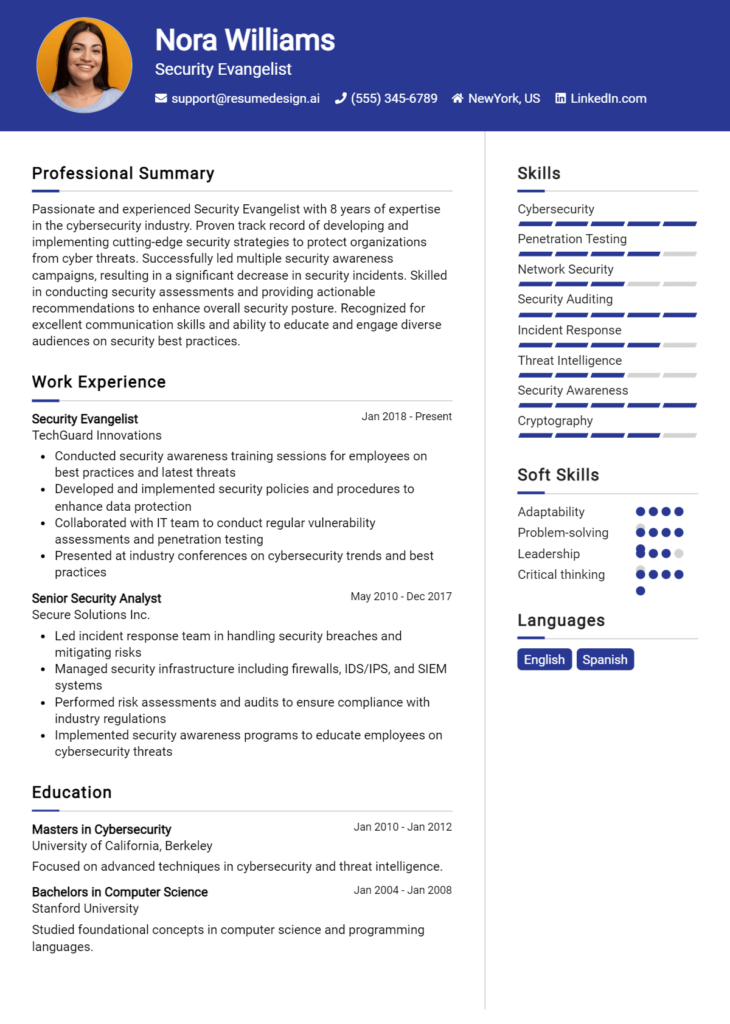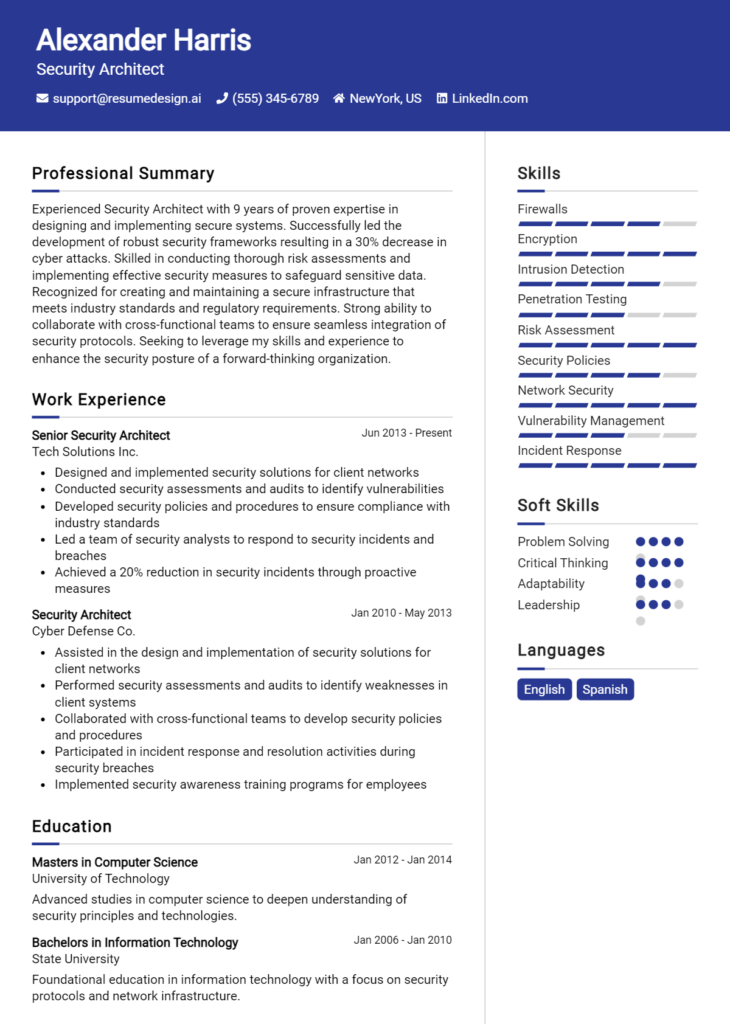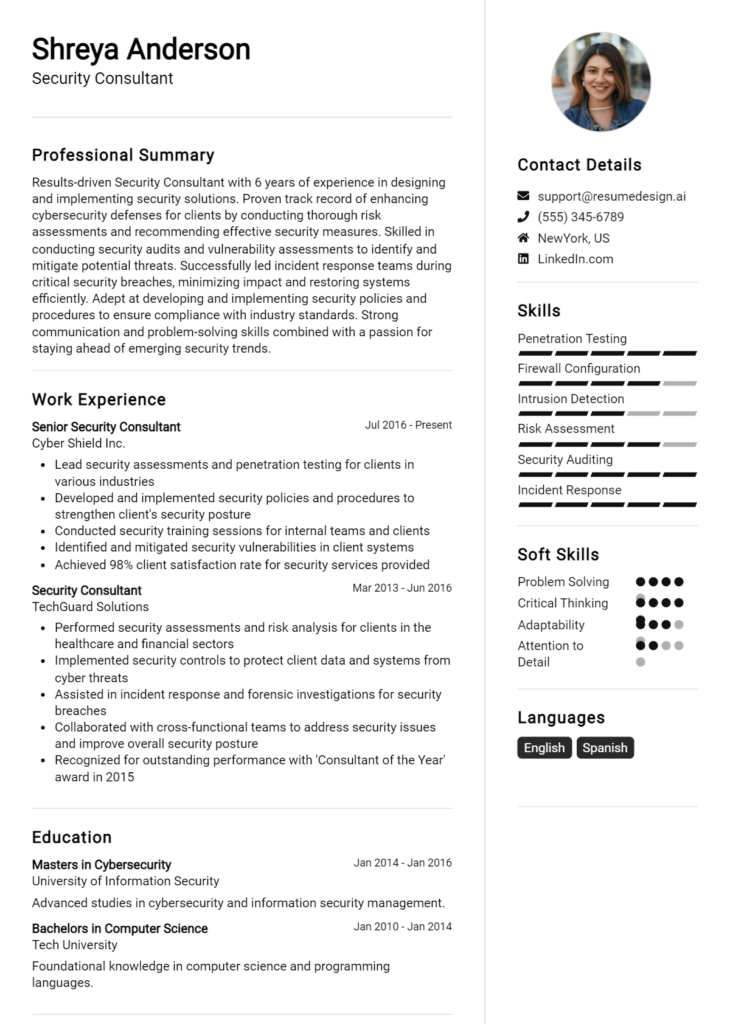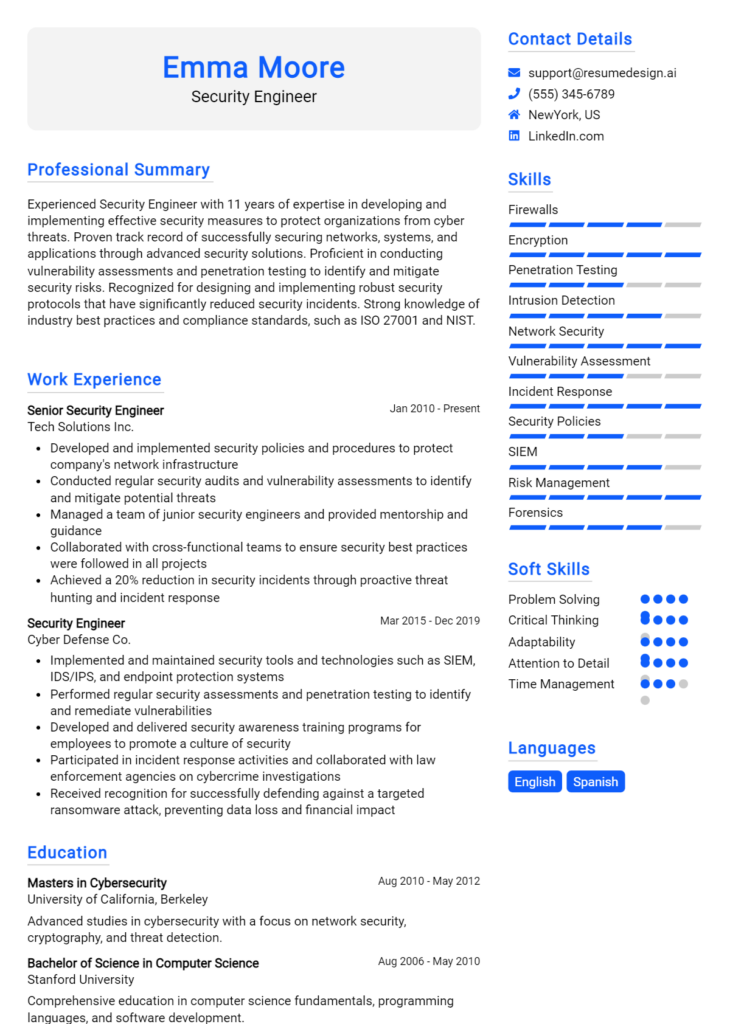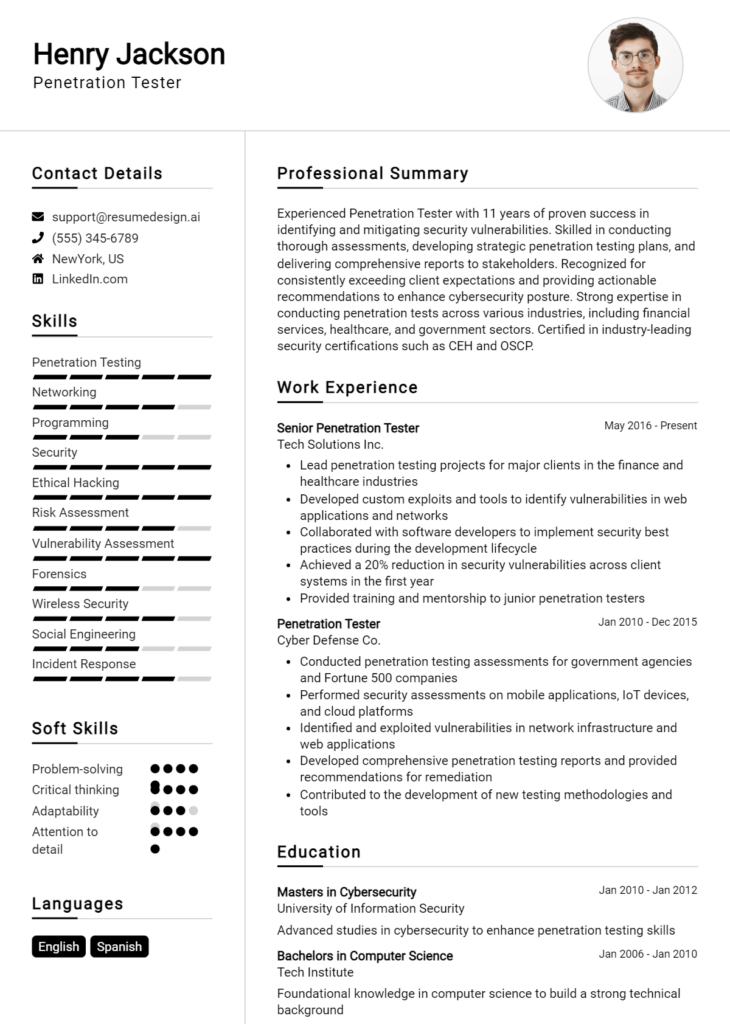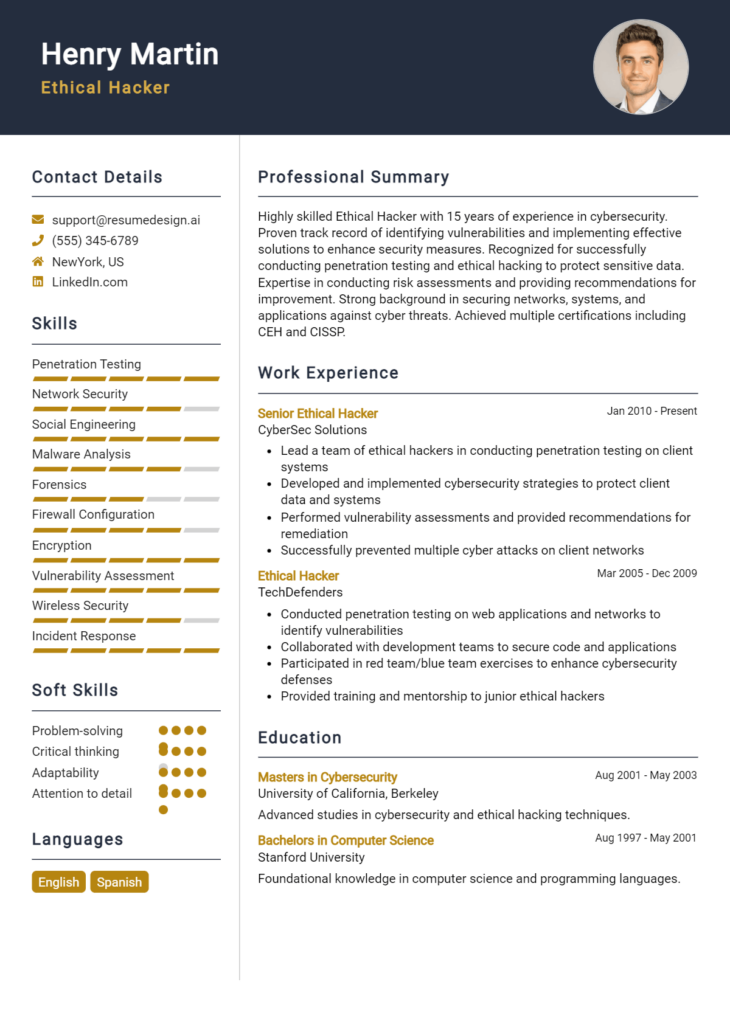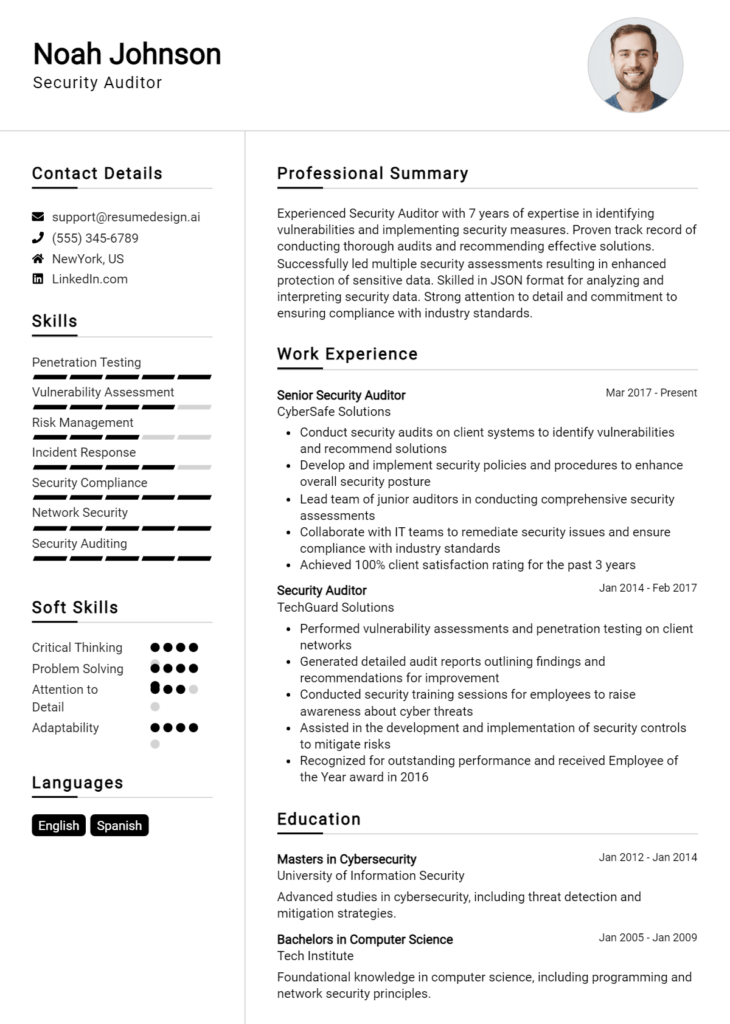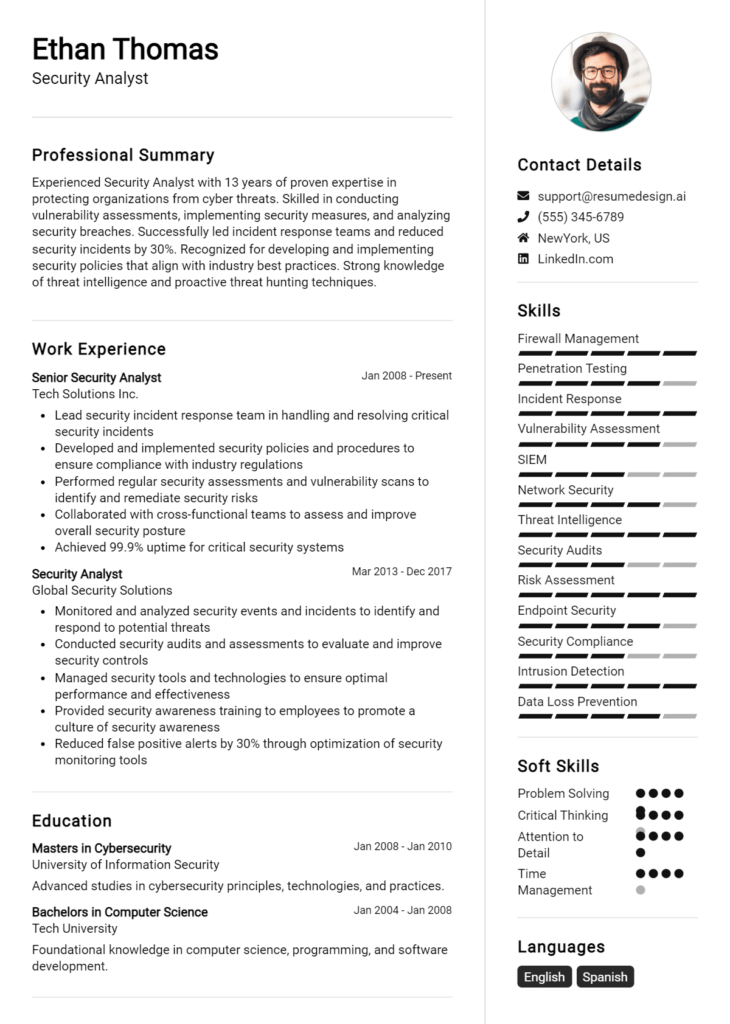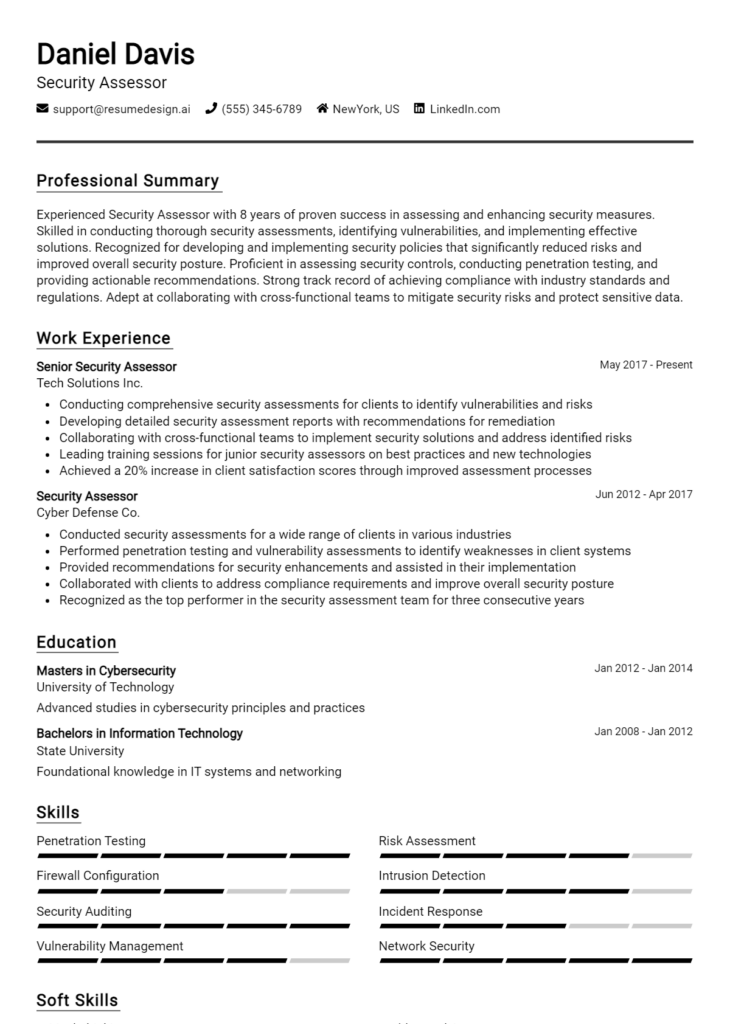Cybersecurity Specialist Core Responsibilities
A Cybersecurity Specialist plays a crucial role in safeguarding an organization’s information assets by implementing security protocols and monitoring threats. This position requires a blend of technical expertise, operational awareness, and strong problem-solving skills to effectively bridge IT, compliance, and business departments. By analyzing vulnerabilities and developing strategies, they contribute to the organization’s overall security posture. A well-structured resume highlighting these skills can significantly enhance job prospects in this competitive field.
Common Responsibilities Listed on Cybersecurity Specialist Resume
- Conducting risk assessments to identify vulnerabilities in systems and networks.
- Implementing security measures and monitoring for breaches.
- Responding to security incidents and managing crisis situations.
- Developing and enforcing security policies and procedures.
- Collaborating with IT teams to secure network infrastructure.
- Conducting security audits and compliance checks.
- Staying updated on emerging threats and cybersecurity trends.
- Providing training and awareness programs for employees.
- Managing identity and access management systems.
- Documenting security incidents and creating reports for stakeholders.
- Utilizing security tools and software for threat detection and response.
- Engaging with external partners to ensure security best practices.
High-Level Resume Tips for Cybersecurity Specialist Professionals
In the competitive field of cybersecurity, a well-crafted resume is essential for professionals aiming to make a lasting impression on potential employers. Your resume is often the first opportunity to showcase your skills, experience, and achievements, serving as a powerful marketing tool that sets the stage for your career. For Cybersecurity Specialists, it’s crucial that this document not only highlights technical proficiencies but also conveys your unique contributions to past employers. This guide will provide practical and actionable resume tips specifically tailored for Cybersecurity Specialist professionals, ensuring that your resume stands out in a crowded job market.
Top Resume Tips for Cybersecurity Specialist Professionals
- Tailor your resume to the job description by incorporating relevant keywords and phrases that align with the specific role you are applying for.
- Showcase relevant experience, focusing on roles that involved cybersecurity responsibilities, and describe your contributions in detail.
- Quantify your achievements using metrics, such as the percentage of security threats mitigated or the number of successful system audits completed.
- Highlight industry-specific skills, including familiarity with cybersecurity frameworks, compliance standards, and tools such as firewalls and intrusion detection systems.
- Include certifications like CISSP, CEH, or CompTIA Security+ to demonstrate your commitment to professional development and expertise in the field.
- Utilize a clean, professional format that enhances readability, ensuring that key information is easily accessible to hiring managers.
- Incorporate a strong summary statement that encapsulates your professional identity, highlighting your strengths and career objectives.
- List relevant technical proficiencies, including programming languages, operating systems, and software applications that are pertinent to cybersecurity.
- Consider adding a section for projects or case studies that illustrate your problem-solving abilities and hands-on experience in cybersecurity scenarios.
By implementing these resume tips, you can significantly increase your chances of landing a job in the Cybersecurity Specialist field. A targeted, well-structured resume not only showcases your qualifications but also demonstrates your attention to detail and understanding of industry requirements, making you a more attractive candidate to potential employers.
Why Resume Headlines & Titles are Important for Cybersecurity Specialist
In the competitive field of cybersecurity, where expertise and precision are paramount, a well-crafted resume headline or title can set a candidate apart from the crowd. This critical element serves as the first impression for hiring managers, summarizing a candidate's key qualifications in one impactful phrase. A strong headline grabs attention, conveys relevance, and provides a quick insight into a candidate's unique strengths and experiences. It should be concise, directly related to the role, and reflect the specific skills that align with the job being applied for, ensuring that the resume stands out in a sea of applicants.
Best Practices for Crafting Resume Headlines for Cybersecurity Specialist
- Keep it concise: Aim for one to two impactful sentences that clearly summarize your qualifications.
- Be role-specific: Tailor the headline to reflect the specific cybersecurity position you are applying for.
- Highlight key skills: Incorporate relevant keywords and skills that are essential to the job description.
- Showcase your experience: If possible, mention your years of experience or notable achievements in the field.
- Use action-oriented language: Start your headline with strong verbs that convey your capabilities.
- Avoid jargon: Use clear and straightforward language that can be easily understood by hiring managers.
- Stay professional: Maintain a formal tone that reflects the seriousness of the cybersecurity profession.
- Test for impact: Read your headline aloud to see if it resonates and makes an immediate impression.
Example Resume Headlines for Cybersecurity Specialist
Strong Resume Headlines
Certified Cybersecurity Specialist with 5+ Years of Experience in Threat Analysis and Mitigation
Results-Driven Cybersecurity Expert Skilled in Incident Response and Risk Management
Proven Cybersecurity Analyst with a Track Record of Securing Networks for Fortune 500 Companies
Weak Resume Headlines
Cybersecurity Professional
IT Specialist Looking for a Job
The strong headlines are effective because they clearly communicate specific qualifications and experiences relevant to the cybersecurity role, giving hiring managers a clear picture of what the candidate brings to the table. In contrast, the weak headlines lack detail and specificity, failing to capture attention or convey the candidate's unique value. A compelling headline should always aim to stand out and provide a clear reason for the hiring manager to explore the resume further.
Writing an Exceptional Cybersecurity Specialist Resume Summary
A resume summary is a critical component for a Cybersecurity Specialist, as it serves as the first impression a hiring manager will have of a candidate. A well-crafted summary quickly captures attention by effectively showcasing key skills, relevant experience, and notable accomplishments that align with the job role. In a field as dynamic and competitive as cybersecurity, it is essential that the summary is concise, impactful, and tailored specifically to the position being applied for. By doing so, candidates can highlight their unique qualifications and set themselves apart from the competition right from the start.
Best Practices for Writing a Cybersecurity Specialist Resume Summary
- Quantify achievements: Use numbers and statistics to demonstrate the impact of your work.
- Focus on relevant skills: Highlight technical skills that are directly related to the cybersecurity role.
- Tailor the summary: Customize the summary for each job application based on the job description.
- Use industry keywords: Incorporate terminology that aligns with the cybersecurity field to pass automated screenings.
- Showcase certifications: Mention any relevant certifications that substantiate your expertise.
- Highlight problem-solving abilities: Emphasize experience in identifying and mitigating security threats.
- Keep it concise: Aim for 3-5 sentences that capture your essence without being overly verbose.
- Convey passion and commitment: Express genuine interest in cybersecurity to resonate with hiring managers.
Example Cybersecurity Specialist Resume Summaries
Strong Resume Summaries
Results-driven Cybersecurity Specialist with over 7 years of experience in threat analysis and risk management, successfully reducing security breaches by 40% through the implementation of advanced monitoring technologies. Certified CISSP and CEH with expertise in penetration testing and vulnerability assessments.
Detail-oriented Cybersecurity Analyst with a proven track record of safeguarding enterprise data. Spearheaded a security protocol overhaul that decreased incident response time by 30%, leveraging skills in intrusion detection and incident management. Holds a CompTIA Security+ certification.
Innovative Cybersecurity Specialist with a strong foundation in malware analysis and digital forensics. Led a cross-functional team in a project that enhanced security posture, resulting in a 50% reduction in phishing attacks. Proficient in SIEM tools and compliance regulations.
Weak Resume Summaries
Cybersecurity professional with some experience looking for a new opportunity. I have skills in various areas and am eager to learn more.
Dedicated worker in the field of cybersecurity. I am interested in protecting systems and have done some related work in the past.
The strong resume summaries are considered effective because they are specific, highlight measurable achievements, and demonstrate a clear alignment with the cybersecurity role. They use industry-relevant terminology and showcase a candidate's qualifications in a compelling manner. In contrast, the weak summaries lack detail, quantifiable results, and fail to convey the candidate's unique skills or enthusiasm for the job, making them less impactful to potential employers.
Work Experience Section for Cybersecurity Specialist Resume
The work experience section of a Cybersecurity Specialist resume is pivotal in demonstrating a candidate's technical acumen, leadership capabilities, and contribution to high-quality project outcomes. This section serves as a platform for candidates to articulate their hands-on experience with cybersecurity tools, methodologies, and frameworks, thereby showcasing their ability to protect organizational assets. Additionally, it reflects their ability to manage teams, collaborate effectively across departments, and deliver solutions that meet or exceed industry standards. To stand out, candidates must quantify their achievements and align their experience with recognized benchmarks in the cybersecurity field, providing tangible evidence of their impact and expertise.
Best Practices for Cybersecurity Specialist Work Experience
- Focus on relevant technical skills and tools used in previous roles.
- Quantify achievements with metrics such as percentage improvements, cost savings, or risk reductions.
- Highlight leadership roles or experiences where team management was crucial.
- Describe collaborative projects that demonstrate the ability to work across functional areas.
- Align experience descriptions with industry standards and best practices.
- Use active language to convey a sense of initiative and ownership.
- Include certifications or training relevant to specific technologies or methodologies.
- Tailor the work experience to the job description to ensure relevance.
Example Work Experiences for Cybersecurity Specialist
Strong Experiences
- Led a team of 5 in implementing a multi-layered security protocol that reduced data breaches by 40% within one year.
- Managed a comprehensive risk assessment project that identified over $500,000 in potential vulnerabilities, leading to prioritized remediation efforts.
- Collaborated with cross-functional teams to deploy a new intrusion detection system, resulting in a 35% improvement in threat detection times.
- Developed and delivered training programs on cybersecurity best practices, increasing employee compliance rates by 60%.
Weak Experiences
- Worked on various cybersecurity projects.
- Assisted in implementing security measures.
- Involved in team meetings about cybersecurity issues.
- Helped with the documentation of security policies.
The examples of strong experiences are considered effective because they provide specific, quantifiable outcomes that showcase the candidate's direct contributions and leadership in impactful projects. They highlight technical expertise and collaboration, demonstrating a clear understanding of the cybersecurity landscape. In contrast, the weak experiences lack detail and quantifiable results, making it difficult to gauge the candidate's actual impact and skills. This vagueness fails to impress potential employers, as it does not illustrate a clear picture of the candidate's capabilities or accomplishments in the field.
Education and Certifications Section for Cybersecurity Specialist Resume
The Education and Certifications section of a Cybersecurity Specialist resume is crucial as it underscores the candidate's academic qualifications, industry-relevant certifications, and commitment to continuous learning. This section not only highlights the foundational knowledge gained through formal education but also showcases specialized training and certifications that align with the demands of the cybersecurity field. By including relevant coursework, recognized certifications, and any ongoing education efforts, candidates can significantly enhance their credibility, demonstrating to potential employers that they possess the necessary skills and knowledge to excel in a fast-paced and ever-evolving industry.
Best Practices for Cybersecurity Specialist Education and Certifications
- Prioritize relevant education and certifications that align with the job description.
- Include the full name of the degree or certification, along with the institution or organization that awarded it.
- Highlight advanced and industry-recognized credentials, such as CISSP, CEH, or CISM.
- Provide specific coursework that is pertinent to cybersecurity, such as network security, ethical hacking, or risk management.
- Indicate the date of completion for degrees and certifications to reflect current knowledge.
- Consider including ongoing education, such as workshops, webinars, or online courses relevant to cybersecurity trends.
- Use bullet points to clearly present information for easy readability.
- Tailor the section for each job application, focusing on the most relevant qualifications for the specific role.
Example Education and Certifications for Cybersecurity Specialist
Strong Examples
- Bachelor of Science in Cybersecurity, University of Technology, 2022
- Certified Information Systems Security Professional (CISSP), (ISC)², 2023
- CompTIA Security+ Certification, CompTIA, 2022
- Coursework: Advanced Network Security, Ethical Hacking, Cybersecurity Risk Management
Weak Examples
- Associate Degree in General Studies, Community College, 2010
- Microsoft Office Specialist Certification, Microsoft, 2015
- Training in Windows Server Administration, 2016
- Coursework: Introduction to Psychology, Basic Mathematics
The strong examples are considered effective as they provide specific qualifications directly related to the cybersecurity field, showcasing relevant degrees and certifications that are widely recognized in the industry. In contrast, the weak examples reflect outdated or irrelevant qualifications that do not align with the skills and knowledge required for a Cybersecurity Specialist role, potentially diminishing the candidate's appeal to employers seeking specialized expertise.
Top Skills & Keywords for Cybersecurity Specialist Resume
As a Cybersecurity Specialist, having the right skills is paramount to effectively protect an organization’s information systems from potential threats. A well-crafted resume that highlights both hard and soft skills can make a significant difference in standing out to potential employers. Skills not only demonstrate your technical proficiency but also showcase your ability to collaborate, communicate, and adapt in a rapidly evolving field. Therefore, it is essential to curate a resume that effectively illustrates your competencies, ensuring that your skills align with the demands of the cybersecurity landscape.
Top Hard & Soft Skills for Cybersecurity Specialist
Soft Skills
- Problem-solving
- Critical thinking
- Communication
- Team collaboration
- Attention to detail
- Adaptability
- Time management
- Decision-making
- Analytical skills
- Conflict resolution
- Creativity
- Ethical judgment
Hard Skills
- Network security
- Risk assessment
- Incident response
- Penetration testing
- Vulnerability management
- Security information and event management (SIEM)
- Firewall configuration
- Malware analysis
- Encryption technologies
- Cloud security practices
- Compliance standards (e.g., GDPR, HIPAA)
- Programming languages (e.g., Python, C++)
- Security frameworks (e.g., NIST, ISO 27001)
- Threat intelligence analysis
For a more comprehensive exploration of relevant skills, you can check out the skills section. Additionally, highlighting your work experience in cybersecurity roles can further strengthen your resume and showcase your practical application of these skills.
Stand Out with a Winning Cybersecurity Specialist Cover Letter
Dear Hiring Manager,
I am writing to express my interest in the Cybersecurity Specialist position at [Company Name], as advertised on [Job Board/Company Website]. With a strong background in information security, risk management, and threat analysis, I am confident in my ability to contribute effectively to your team and help safeguard your organization against emerging cyber threats. My experience includes working with various security frameworks, conducting vulnerability assessments, and implementing robust security measures that align with industry standards.
In my previous role at [Previous Company Name], I successfully led a project to overhaul our security protocols, which resulted in a 40% reduction in security incidents over the course of a year. I am adept at identifying vulnerabilities and developing strategies to mitigate risks, and I have a proven track record of collaborating with cross-functional teams to enhance security awareness and best practices across the organization. My technical skills, including proficiency in intrusion detection systems, firewalls, and endpoint protection, enable me to respond swiftly to potential threats while maintaining compliance with regulatory requirements.
I am particularly drawn to [Company Name] because of its commitment to innovation and excellence in cybersecurity. I admire your proactive approach to security and believe that my skills in threat intelligence and incident response would complement your existing efforts. I am eager to contribute to a forward-thinking team that values collaboration and continuous improvement in the ever-evolving landscape of cybersecurity.
Thank you for considering my application. I look forward to the opportunity to discuss how my experience and passion for cybersecurity can support [Company Name] in achieving its security goals. I am excited about the possibility of contributing to your esteemed organization and am available for an interview at your earliest convenience.
Sincerely,
[Your Name]
[Your LinkedIn Profile]
[Your Contact Information]
Common Mistakes to Avoid in a Cybersecurity Specialist Resume
When crafting a resume for a Cybersecurity Specialist role, it's crucial to highlight your skills and experiences effectively. However, many candidates make common mistakes that can hinder their chances of landing an interview. Avoiding these pitfalls can significantly improve the quality of your resume and present you as a strong candidate in a competitive field. Here are some common mistakes to steer clear of:
Generic Objectives: Using a vague objective statement that doesn’t specify your goals or how you can contribute to the organization. Tailor your objective to each job application to show your genuine interest.
Overloading with Technical Jargon: While technical skills are vital, bombarding the reader with excessive jargon can be overwhelming. Instead, balance technical terms with clear explanations to ensure your resume is accessible to HR personnel.
Neglecting Soft Skills: Focusing solely on technical abilities and ignoring soft skills like communication, teamwork, and problem-solving. Cybersecurity often requires collaboration, so it's essential to demonstrate these skills as well.
Lack of Quantifiable Achievements: Failing to include measurable accomplishments, such as "reduced incident response time by 30%." Quantifying your impact helps potential employers understand the value you could bring to their organization.
Ignoring Formatting Consistency: Using inconsistent fonts, sizes, or styles can make your resume look unprofessional. Stick to a clean, consistent format to enhance readability and present yourself as organized.
Too Much Information: Providing excessive detail about every job, including irrelevant experiences. Focus on relevant work history and skills that align with the Cybersecurity Specialist role to keep your resume concise.
Omitting Relevant Certifications: Not mentioning important certifications such as CISSP, CEH, or CISM can be a major oversight. These credentials are often crucial in the cybersecurity field and should be prominently displayed.
Spelling and Grammar Errors: Submitting a resume with typos or grammatical mistakes can undermine your professionalism. Always proofread your document or have someone else review it to ensure it is error-free.
Conclusion
As we have discussed, the role of a Cybersecurity Specialist is critical in today’s digital landscape. This position requires a robust understanding of information security protocols, risk management, and the ability to respond to cyber threats effectively. Key skills include proficiency in security software, knowledge of compliance regulations, and expertise in threat assessment methodologies. Additionally, certifications such as CISSP, CEH, or CompTIA Security+ can significantly enhance your employability in this competitive field.
In the ever-evolving realm of cybersecurity, having a standout resume is essential for landing your desired position. It’s important to highlight your technical skills, relevant experience, and certifications clearly and concisely. Consider tailoring your resume to reflect the specific requirements of the job you are applying for to make a lasting impression on potential employers.
Now is the perfect time to review and refine your Cybersecurity Specialist resume. Take advantage of the variety of resources available to you, such as resume templates, which can help you structure your document effectively. Utilize the resume builder for a user-friendly way to create a professional-looking resume tailored to your experience. Check out resume examples for inspiration on how to present your qualifications. Additionally, don’t forget to craft a strong cover letter using our cover letter templates to complement your resume.
Take the next step in your career by ensuring your resume reflects your skills and achievements as a Cybersecurity Specialist. Start now and set yourself up for success!

